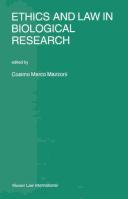| Listing 1 - 1 of 1 |
Sort by
|

ISBN: 9041117423 1417551488 9781417551484 9789041117427 128046805X 9786610468058 9047403061 9789047403067 Year: 2002 Volume: 52 Publisher: Boston : Kluwer Academic Publishers,
Abstract | Keywords | Export | Availability | Bookmark
 Loading...
Loading...Choose an application
- Reference Manager
- EndNote
- RefWorks (Direct export to RefWorks)
Scientific research on biotechnologies has become the protagonist of discoveries that exert a formidable impact on public opinion. Every day popular opinion is challenged by the media, so that it becomes not only a witness of these developments, but is also, to a certain extent, forced to become a judge of those cases where human and animal genetics have been investigated over the last decades. The man-in-the-street is thus confronted by moral positions ranging from cautious approval, to wait-and-see attitudes, to unconditional condemnation. On the other hand, scientists are involved in the ethical evaluation of the results of their own research. However, the results of scientific pursuits are capable of producing immediate effects on the daily life of every human being. Consequently, alongside the scientists, people feel strongly about their need and their right to contribute to an accurate assessment of the effects of science on society. This is a collection of essays reflecting a considerable range of different cultural experiences and different ethical underpinnings. The main subject is cloning. Cloning is the most accessible and most readily perceived point of convergence from which ethical judgments on the current developments of scientific investigations can be proposed. Cloning is also the `paradox' on which the confrontation between scientific research and popular imagination is focused.
Bioethics. --- Cloning --- Medical ethics. --- Moral and ethical aspects. --- Bioethics --- Medical ethics --- Clonage --- Bioéthique --- Ethique médicale --- Moral and ethical aspects --- Law and legislation --- Aspect moral --- Droit --- EPUB-LIV-FT SPRINGER-B --- Biomedical ethics --- Clinical ethics --- Ethics, Medical --- Health care ethics --- Medical care --- Medicine --- Professional ethics --- Nursing ethics --- Social medicine --- Biology --- Life sciences --- Life sciences ethics --- Science --- Genetic engineering --- Reproduction, Asexual --- DROIT MEDICAL --- BIOETHIQUE --- EXPERIMENTATION MEDICALE --- THERAPIE GENETIQUE --- CLONAGE
| Listing 1 - 1 of 1 |
Sort by
|

 Search
Search Feedback
Feedback About UniCat
About UniCat  Help
Help News
News